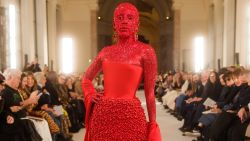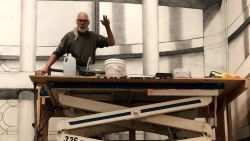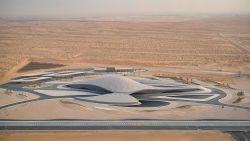At a glance, fashion and architecture are at polar opposites. Fashion is fast. Collections are conceived and created within weeks or months, trends change from season to season. Fashion moves. It shifts on the bodies of models walking fashion week runways, and it travels from factories in China, Turkey and Italy to shops and our high streets around the world.
Architecture, in contrast, is built to last. Buildings can easily take years to complete and they aren’t typically designed to move.
Still, that’s not to say that the two fields live in isolation of each other and that parallels can’t be drawn. As the late French fashion designer Pierre Balmain once said, “Dressmaking is the architecture of movement.”
Fashion and architecture have been in creative conversation since both practices moved beyond simply providing shelter from the elements.
Weaving fashion and architecture
Fashion designers like Hussein Chalayan, Iris van Herpen and Junya Watanabe adapt the shapes and forms of architectural structures to the human body, and new technology has allowed architects like the late Zaha Hadid and Thomas Heatherwick to pleat, wrap and weave building materials much like designers would fabrics.
The architectural backdrop that a fashion show is presented against often shores up the concept for collection itself.
Fashion designers and architects often work closely together on specific projects. Miuccia Prada, the Italian luxury brand’s creative head, and Rem Koolhaas, architecture’s Dutch powerhouse and the founder of the OMA practice, have been collaborating for almost 20 years.
As Koolhaas recalls it, their work together began when Prada and her husband Patrizio Bertelli (Prada’s CEO) turned up at his office, almost unannounced, and “simply sat down and declared they didn’t like their stores anymore.”

Soon they moved beyond stores designs to fashion show runways, accessories and then mammoth Fondazione Prada, the company’s Milanese headquarters, which opened to the public in 2015. An old gin distillery, the compound could be mistaken for a prison with its imposing walls and well-guarded gates, if not for a small gold-leaf clad tower that softens its impact.
Fashion through the eyes of an architect
On the day of Prada’s Autumn-Winter 2018 womenswear show Koolhaas and his team are in Milan, putting the finishing touches on their recent set design for the house. This season, a slick pouring of black resin and a seating arrangement that gives guests a view of the clothes, but also a series of neon figures standing tall outside, peering into the windows of the foundation.

Sitting in OMA’s latest addition to the foundation, an eight-story “torre” that overlooks the rest of the premises. just a few levels up from where the show will be held that evening, the successful and high-octane architect admits something unexpected. He’s a little jealous of what the fashion industry has to offer.
“The beauty of a fashion show is that in a very short time you’re confronted with a series of unique conditions that are all claiming attention and representing beauty and representing an idea … as you look there’s absolutely nothing else you can think of. So it’s really unique, and that intensity of mobilization of your attention, that’s something I almost envy.”

Koolhaas is a strong defender of the discipline of fashion, noting there is “nothing frivolous about it.”
“Architecture is a very old-fashioned profession that actually creates an endless series of prototypes of things that are never repeated. We’re all working, spending time, and in a way wasting our time, creating unique conditions,” he says.
“The beauty of fashion, on the contrary, is that. You make something sublime. If it’s successful you repeat it and it becomes a kind of model that’s endlessly reproduced. And that aspect of fashion is of course deeply impressive and serious.”
Watch the video above to see Prada’s Autumn-Winter 2018 show through the eyes of Rem Koolhaas.





















